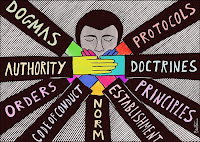 Photo by Ben Heine
Photo by Ben HeineDuring the last months the blogosphere has widely covered the Apple-Flash incident. Apple excluded Flash from the Iphone and the new Ipad; the company justified the decision alleging that they are seeking to use open standards-html5- over a proprietary standard such as Flash.
Leaving aside how questionable can be this decision coming from a company only rivalled by Microsoft in terms of being the most proprietary company in computer industry, this can be an interesting case study to illustrate how protocol is a form of control and at the same time, it is worthwhile to bring attention to the fact that the most affected in this dispute is the end user.
The current Apple’s Software Development Kit-SDK- only allows APIs developed according to rules previously set by the company, while the use or call of any private APIs is excluded. And this includes applications based on Flash.
Steve Jobs published an extensive letter giving all the reasons that Apple is taking into account to take this decision. To ground his arguments, claims that Flash
- is a closed standard,
- that is the main reason why Macs crash,
- that it makes too much consumption of battery
- that is not compatible with touch technology
- and most importantly “letting a third party layer of software come between the platform and the developer ultimately results in sub-standard apps and hinders the enhancement and progress of the platform.”
Galloway points out that protocol has a double nature. On one side, it allows openness and a decentralised organization of the Net due to its open-source based character. But on the other hand, protocol is an “extreme form of control” in the sense that it constrains and homogenises content; everything that is said has to be said in a standardised format, in order to be transmitted in the Net.
Apple has decided to exclude one format to favour another; html5 is the chosen format that the company approves. As end users, we don’t have a saying on this decision; somebody else has made this call for us in what can be considered an exertion of power over the net and the end users.
The point is that users are presented to platforms that have a partial access to the internet, despite arguments given by Apple to explain or Adobe to condemn it, users have no saying on the format they want their contents. This control, in this dispute, is resolved by others.



0 comentarios:
Publicar un comentario